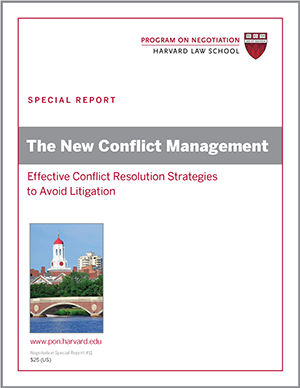
Going to trial, it’s said, is like rolling the dice. In this article, we discuss what negotiators need to be aware of to avoid negotiation games in the courtroom.
That proved true back in June 2006, when an exasperated federal judge, the Honorable Gregory A. Presnell, ordered litigants to play a game of Rock Paper Scissors if they could not privately resolve their differences over a procedural issue. The lawyers were stalemated on where to depose a witness in the case, despite the fact that their offices were located just four floors apart in the same building. The judge didn’t want to waste public resources resolving such a trivial matter.
Many took the order as yet another exhibit in the case against shortsighted lawyers—and an attempt to shame them and their clients into more constructive behavior. Judge Presnell’s ruling also established a new best alternative to a negotiated agreement, or BATNA, for the parties: the matter would be decided by chance rather than on its merits, an unsettling prospect if each side was convinced of the righteousness of its position.
This judicial tactic, of course, goes back to Solomon. In the biblical story, the threat of dividing the baby in two invokes the true mother’s love. By contrast, making a decision with a game of chance is less a matter of producing the “right” result than simply an efficient way of avoiding a tiresome inquiry into which fairness standards should apply.
Perhaps shamed by the publicity their case sparked worldwide, the attorneys privately agreed on a venue for the deposition. Their time might have been better spent competing in the annual $50,000 U.S. Rock Paper Scissors Championship, which took place that spring.
Are You Looking for Negotiation Games?
In addition to more than 200 engaging negotiation games, the Teaching Negotiation Resource Center also offers a wide range of effective teaching materials, including:
Most TNRC negotiation games and teaching materials are designed for educational purposes. They are used in college classroom settings or corporate training settings; used by mediators and facilitators seeking to introduce their clients to a processor issue, and used by individuals who want to enhance their negotiation skills and knowledge.
Which negotiation games have you found to be successful? Share them with us in the comments.
Adapted from “Rolling the Dice in Court,” first published in the Negotiation newsletter.





The Rock/Paper/Scissors story brought to mind a local Juvenile Court judge who was removed from office for, among other things, deciding a relatively minor visitation issue by conducting an in-chambers coin flip. That was the least serious offense but these incidents highlight the advantage of negotiation over the riskiness of litigation. At least the federal judge gave the attorneys control over the outcome of the game.
Brilliantly elaborated and and definitely insightful. I am old fan of PON.